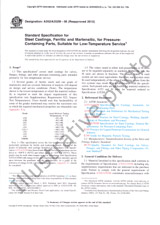We need your consent to use the individual data so that you can see information about your interests, among other things. Click "OK" to give your consent.
ASTM E2536-21
Standard Guide for Assessment of Measurement Uncertainty in Fire Tests
Translate name
STANDARD published on 1.10.2021
The information about the standard:
Designation standards: ASTM E2536-21
Publication date standards: 1.10.2021
SKU: NS-1041770
The number of pages: 13
Approximate weight : 39 g (0.09 lbs)
Country: American technical standard
Category: Technical standards ASTM
The category - similar standards:
Ignitability and burning behaviour of materials and products
Annotation of standard text ASTM E2536-21 :
Keywords:
fire test, fire test laboratory, measurand, measurement uncertainty, quality,, ICS Number Code 13.220.40 (Ignitability and burning behaviour of materials and products)
Additional information
| Significance and Use | ||||||||||||
|
5.1?Users of fire test data often need a quantitative indication of the quality of the data presented in a test report. This quantitative indication is referred to as the measurement uncertainty. There are two primary reasons for estimating the uncertainty of fire test results. 5.1.1?ISO/IEC 17025 requires that competent testing and calibration laboratories include uncertainty estimates for the results that are presented in a report. 5.1.2?Fire safety engineers need to know the quality of the input data used in an analysis to determine the uncertainty of the outcome of the analysis. |
||||||||||||
| 1. Scope | ||||||||||||
|
1.1?This guide covers the evaluation and expression of uncertainty of measurements of fire test methods developed and maintained by ASTM International, based on the approach presented in the GUM. The use in this process of precision data obtained from a round robin is also discussed. 1.2?The guidelines presented in this standard can also be applied to evaluate and express the uncertainty associated with fire test results. However, it may not be possible to quantify the uncertainty of fire test results if some sources of uncertainty cannot be accounted for. This problem is discussed in more detail in Appendix X2. 1.3?Application of this guide is limited to tests that provide quantitative results in engineering units. This includes, for example, methods for measuring the heat release rate of burning specimens based on oxygen consumption calorimetry, such as Test Method E1354. 1.4?This guide does not apply to tests that provide results in the form of indices or binary results (for example, pass/fail). For example, the uncertainty of the Flame Spread Index obtained according to Test Method E84 cannot be determined. 1.5?In some cases additional guidance is required to supplement this standard. For example, the expression of uncertainty of heat release rate measurements at low levels requires additional guidance and uncertainties associated with sampling are not explicitly addressed. 1.6?This fire standard cannot be used to provide quantitative measures. 1.7?The values stated in SI units are to be regarded as standard. No other units of measurement are included in this standard. 1.8?This international standard was developed in accordance with internationally recognized principles on standardization established in the Decision on Principles for the Development of International Standards, Guides and Recommendations issued by the World Trade Organization Technical Barriers to Trade (TBT) Committee. |
||||||||||||
| 2. Referenced Documents | ||||||||||||
|



 Cookies
Cookies
